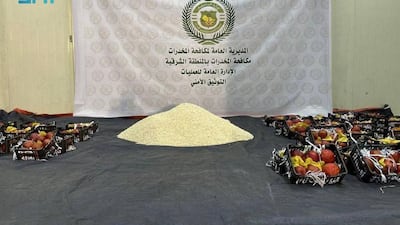A shipment of more than 5.3 million amphetamine pills hidden inside pomegranates seized by Saudi Arabia originated in Syria, not Lebanon, representatives of the Lebanese agriculture industry said.
The claim came after the drug seizure at Jeddah Islamic Port prompted Riyadh to ban imports of fruit and vegetables originating from or transiting through Lebanon with effect from Sunday. Saudi Arabia is one of the biggest markets for Lebanese fruit and vegetables.
Caretaker Interior Minister Mohammed Fahmi said Lebanon was willing to increase co-operation with Saudi Arabia to combat such smuggling. The government “has been exerting tremendous efforts combating drug smuggling”, the minister said.
Ibrahim Tarshishi, the head of the Bekaa Farmers’ Association, denied the pomegranate shipment had come from Lebanon, saying the country had become an importer of pomegranates.
“Lebanese agricultural production is innocent of the accusation of exporting drugs to the Kingdom of Saudi Arabia,” a statement issued by Mr Tarshishi said.
“We do not have pomegranates to export; rather we import them."
The Saudi seizure of Captagon pills, a type of amphetamine, was followed by the discovery of more than four tonnes of processed cannabis in the Greek port of Piraeus. Greek authorities estimated the shipment, originating from Lebanon and destined for Slovakia, to be worth about €33 million ($39.9m).
The production of Captagon in Syria has boomed since the country’s civil war erupted a decade ago, with neighbouring Lebanon serving as the main route for the drug to enter the global market. The Lebanese party and militant group Hezbollah is an ally of the Syrian regime.






